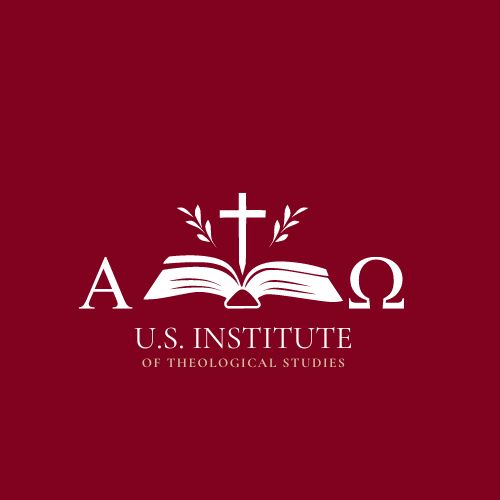Theological Programs
Welcome to the online Master of Theology program at USITS. We invite you to become deeply anchored in truth through our rigorous course offerings, class discussions, and transformative journey to deepened theological understanding and spiritual growth.
Our programs are designed to move and grow with you through our 100% online study format. Each course is equipped with tech-savvy professors and TA’s who will assist you on your Biblical education journey from beginning to end, and from Genesis to Revelation.

Programs Overview
Master of Theology (Th.M.)
Welcome to the online Master of Theology program and Certificate in Biblical Studies program at USITS! Our programs are designed to provide an enriching and accessible educational experience, empowering you to become a deeply rooted, thoughtful, and impactful ministry leader.
Students will examine key aspects of Christian faith, including the nature of God, the life and teachings of Jesus Christ, and the role of the Holy Spirit. Through engaging lectures, interactive discussions, and critical readings, participants will gain a solid foundation in Christian theology and its impact on both historical and contemporary Christian practices. The course will also address the development of Christian thought and its influence on ethics, worship, and community life. By the end of the course, students will be better equipped to understand and articulate their own beliefs within the broader context of Christian tradition.
After this course, you will be able to:
- Articulate core Christian doctrines and their scriptural foundations.
- Analyze the significance of key events in the history of Christian thought.
- Compare and contrast various Christian theological perspectives and their implications.
- Critically evaluate the impact of Christian theology on personal faith and church practices.
This course explores key theological constructs such as the nature of prophetic literature, and the evolution of early Christian doctrine. Students will engage in critical exegesis of significant biblical texts, considering their historical, cultural, and literary contexts. By integrating historical-critical methods with theological reflection, participants will gain a nuanced understanding of the role of figurative language in shaping understanding of prophetic texts Christian doctrine.
After this course, you will be able to:
- Conduct detailed exegesis of advanced theological themes and literary structures in the Old and New Testaments.
- Contextualize significant biblical passages within their historical, cultural, and covenantal frameworks.
- Synthesize knowledge from both Testaments to articulate a coherent understanding of Christian redemptive history and its implications for modern faith practice.
This course investigates complex theological concepts through the lens of figurative language, historical context, and modern perspectives. Students will critically engage with texts through advanced exegetical methods, exploring their intertextual connections and theological interpretations. The course will also focus on the impact of these texts on historical and contemporary Christian thought. By employing interdisciplinary approaches, including historical, literary, and theological analysis, participants will develop a comprehensive understanding of Scripture’s significance within both its original context and modern application.
After this course, you will be able to:
- Apply advanced exegetical methods to analyze complex theological themes and literary forms in the Old and New Testaments.
- Evaluate the significance of eschatological concepts within the biblical narrative.
- Investigate the formation and evolution of early church orthodoxy and its influence on Christian doctrine.
- Critically assess the impact of biblical texts on historical and contemporary theological debates.
This course covers essential topics such as the doctrine of God, the nature of revelation, and the theological implications of creation and providence. Students will engage with primary theological texts, examining historical and contemporary perspectives to understand how core doctrines have been formulated and defended. The course emphasizes critical thinking and theological reflection, equipping students to articulate and analyze key aspects of Christian belief systematically. Through lectures, readings, and discussions, participants will develop a coherent framework for understanding and applying systematic theology in both academic and practical contexts.
After this course, you will be able to:
- Articulate and analyze the foundational doctrines of Christian theology, including the nature and attributes of God, revelation, and creation.
- Systematically organize and integrate core theological concepts within a coherent framework.
- Evaluate historical and contemporary theological perspectives on essential doctrines.
- Develop critical skills in theological reflection and analysis, contributing to both scholarly and practical discussions in theology.
This course examines the theological foundations of discernment, including the role of the Holy Spirit, scriptural guidance, and the dynamics of personal and communal decision-making. Students will study various methods and models for discerning spiritual truth, evaluating the authenticity of spiritual experiences, and distinguishing between divine guidance and other sources of influence. Through case studies, reflective practices, and scholarly analysis, participants will develop skills to navigate complex spiritual and ethical decisions with greater clarity and confidence. The course aims to integrate theoretical knowledge with practical application, fostering a deeper, more informed approach to spiritual discernment.
After this course, you will be able to:
- Articulate the theological foundations of spiritual discernment, including the role of the Holy Spirit and scriptural principles.
- Evaluate and apply various methods and models for discerning spiritual truth and authenticity.
- Develop practical strategies for making and providing counsel on spiritually informed decisions and addressing ethical dilemmas.
This course examines the theological and historical foundations of missional ecclesiology, focusing on how the church’s mission is defined, developed, and enacted in various cultural settings. Students will investigate key concepts such as the missio Dei (mission of God), the role of the church in global and local contexts, and the integration of mission and ecclesial life. Through an analysis of biblical texts, historical developments, and current missional practices, students will develop a comprehensive understanding of how ecclesiology informs and shapes the church’s mission. The course emphasizes critical reflection on how churches can effectively engage in mission while remaining faithful to their theological roots and contextual realities.
After this course, you will be able to:
- Articulate the theological and historical foundations of missional ecclesiology and its relevance to contemporary church practice.
- Analyze the concept and implications for understanding the church’s role in mission.
- Evaluate different models and strategies for integrating mission with ecclesial identity and practice.
- Develop practical approaches for enhancing the effectiveness of the church’s mission in both local and global contexts.

